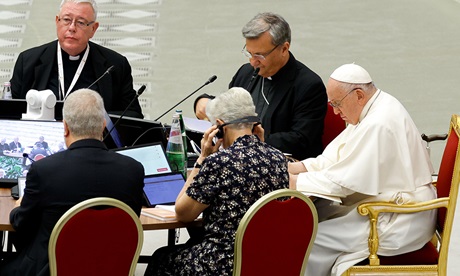As the official synodal process enters its fourth year, the Vatican recently released the document, the instrumentum laboris, to guide discussions for the October 2024 synod.
The document was relatively stunning in its admission of challenges, beauty of language on the Trinity and Christ and mission; and, for its announcement that opening the diaconate for women will not be a topic of discussion at this coming October synod in Rome.
But there were many omissions — too many for a document that was to lay out the next steps in the “listening” process called synodality.
When it comes to my beloved Catholic Church, I am a realist.
I did not expect there to be a decision on women deacons finalised and announced after the October synod.
I did, however, expect input from experts, robust dialogue, learning and discerning among those present.
Last year’s proposal
The synthesis report from last October contained 81 proposals.
Those proposals included bishop accountability, enhancing priest engagement in the synod, more formation for laity and priests, establishing ministries for youth in local parishes, and increasing awareness of Catholic social doctrine, among many others.
The proposals were contained within the document’s three major parts: “The Face of the Synodal Church,” “All Disciples, All Missionaries,” and “Weaving Bonds, Building Communities.”
These proposals were the outcome of global listening sessions in parishes, schools and other institutions; with results compiled into diocesan, national and then continental reports.
These reports from around the world were reviewed, analysed and summarised in the Document for the Continental Stage. That information then led to the instrumentum laboris, which guided the discussions for the October 2023 in Rome.
Each of these reports contained the aspirations and frustrations of Catholics from around the world and provided a foundation for future listening and discussion.
The Document for the Continental Stage, for example, opened with the call for us to “enlarge the space of your tent, spread out your tent clothes unsparingly; lengthen your ropes and make firm your pegs” (Isaiah 54:2), urging the church to expand the horizons of our structure and mission.
This month, the instrumentum laboris for the October 2024 synod discussions in Rome was released, with 112 separate assertions. Paragraph 17 notes:
“While some local Churches call for women to be admitted to the diaconal ministry, others reiterate their opposition.
“On this issue, which will not be the subject of the work of the Second Session, it is good that theological reflection should continue, on an appropriate timescale and in the appropriate ways.
“The fruits of Study Group 5, which will take into consideration the results of the two Commissions that have dealt with the question in the past, will contribute to its maturation.”
The problem
Here’s my fundamental issue with this declaration.
The synthesis report from last October included 81 separate proposals.
Of those 81, the only one itemised as “not … the subject of work of the second session” is one regarding women’s ordination as deacons.
That, along with Pope Francis’ “no” response during a recent interview about whether little girls can look forward to being deacons in the future, is a bit chilling.
While there is language about continued theological reflection — it does seem odd to call out this issue as the only one off the synod table.
Also odd is the rationale.
The fact that some churches call for women’s ordination and others do not is an inadequate reason for not discussing an issue.
I would argue every one of those 81 proposals has some support and some opposition.
Since when has 100 percent agreement in the Catholic Church been a criterion for moving forward?
Aside from a handful of the obvious, I can’t name a single theological, social, political or moral issue all Catholics can agree with. (Even the “obvious” might be a challenge.)
Here are the practical impacts of this decision.
Catholics around the world are hopeful about changes that could arise from collective listening to the Holy Spirit.
People have spent hours engaged in the process; speaking from the heart about what they love about the church — and what breaks their heart.
My simple expectation is to continue the process.
We know the church is proud of “thinking in centuries” and that change comes slowly. It is, however, even slower when you don’t bother to fully discuss an issue in an ongoing listening and discerning process.
Women deacons necessary
Fundamentally, the church needs women deacons.
I attended Seattle University School of Theology and Ministry and the Jesuit School of Theology Sabbatical Renewal Program. I also participated in the Loyola Institute of Spirituality Spiritual Exercises for Everyday Life.
In each of these sessions, as well as in my parishes, I have met many women capable of serving as deacons, and frankly, as priests. Read more
- Daryl Grigsby is an author and is currently a presenter in the Jesuit School of Theology Sabbatical Renewal Program.
